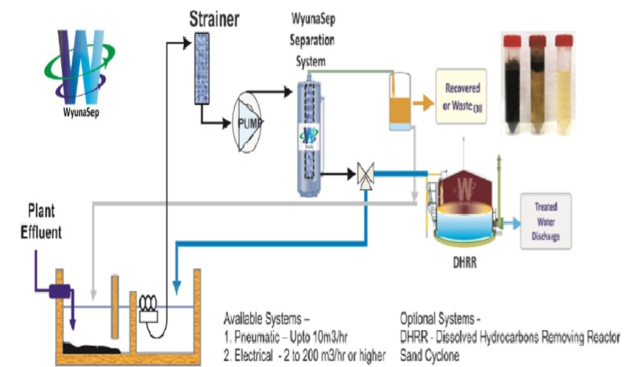EMULSIFIED OIL SEPARATORS
The edible oil refineries have increased in the last few years, with a corresponding increase in oil production. As a result, edible oil containing wastewaters (EOCW) are being produced in huge quantities. Conventional technologies are inefficient in treating these wastewaters due to the highly hydrophobic nature of the lipids
Industry manufacturing refined edible oil generate wastewaters and solid wastes (viz. spent earth, chemical and biological sludge). The wastewater streams were mainly from vat house after soap splitting, floor washing, cooling tower, boiler and filter press. The chemical composition of the wastewater from cooling tower and boiler sections and solid wastes indicates that these wastes could be recycled and reused in the process after preliminary treatment. The combined wastewater from other streams is being treated in the existing effluent treatment plant (ETP) and the treated effluent in not always conforming to the limits prescribed for discharge into inland surface water as stipulated by Central Pollution Control Board, Government of India.
Refining crude vegetable oils generates large amounts of wastewater. In the edible oil industry, wastewaters mainly come from the degumming, deacidification and deodorization and neutralization steps. In the neutralization step, sodium salts of free fatty acid (soap stocks) are produced whose splitting through the use of H2SO4 generates highly acidic and oily wastewaters. Its characteristics depend largely on the type of oil processed and on the process implemented that are high in COD, oil and grease, sulphate and phosphate content, resulting in both high inorganic as well as organic loading of the relevant wastewater treatment works.
With overloaded municipal facilities and increasingly restrictive water quality regulations, it has become necessary to restrict industrial waste loads. Vegetable oil refineries generate a high BOD loading along with a high fat loading, which makes treatment difficult.
Major wastewater sources and processes are defined and described. Refinery wash water from the oil water wash centrifuges was found to be the major contributor of BOD5 and fat, with barometric cooling tower blow down and water from acidulation contributing smaller amounts to the load.
Cooling Tower – Oil Water Separation: It has been observed that due to vacuum process most of Veg Oil refineries cooling tower water contains very significant to large quantity of oil in its cooling tower water. This water has become main cause of the extra burden on cooling tower maintenance and cooling tower not working to its full efficiency as the oil film and oil content reduces the heat transfer as well as quality of water. This also increases the water load and the load on the ETP.
With the help of WyunaSep Oil recovery system and ETP-Pretreatment system.
-
- You can recover all the free oil in the system – Waste water as well as Cooling tower water
- Increases good quality of recovered oil, as it is recovered before any treatments in ETP.
- Reduces load on ETP further treatment.
- Increases cooling tower efficiency, by removing the oil from its water.
- Reduces Cooling tower maintenance requirement.
- Saves operators time and efforts to handle dirty water.
- With help of ETP Pre- treatment system – you can reduce the solids load on your ETP.
- Due to reduction in solids prior to ETP reduces load on pumps and chemical dosing in further treatments.
- It also helps in downsizing the further treatments and filter presses for solids handling.
Applications
-
-
- Oil Recovery from Wash water
- Oil recovery from Cooling Tower water
- Oil Recovery at Hot well wash water
- Solids and Oil removal before ETP

Water Matrix is always ready to help you in keeping your plant compliant in any situation. For inquiry, mail us at info@watermatrix.net | Call us at: +9716557 1647

